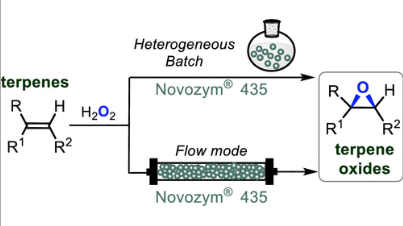A commercially available Lipase B from Candida antarctica immobilized onto a macroporous support (Novozym 435) has been employed in the presence of H2O2 as a benign oxidant for the epoxidation of various biorenewable terpenes. This epoxidation protocol was explored under both heterogeneous batch and continuous flow conditions. The catalyst recyclability was also investigated demonstrating good activity throughout 10 cycles under batch conditions, while the same catalyst system could also be productively used under continuous flow operation for more than 30 h. This practical and relatively safe sustainable flow epoxidation of di- and trisubstituted alkenes by H2O2 allows for the production of gram quantities of a range of terpene epoxides. As a proof of principle, the same protocol can also be applied to the epoxidation of biobased polymers as a means to post-functionalize these macromolecules and equip them with cross-linkable epoxy groups.
